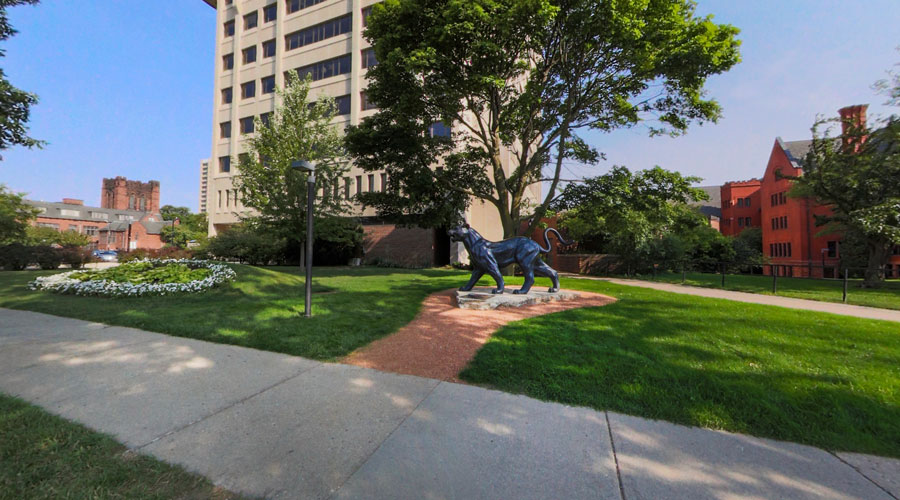Urban Education Doctoral Program PhD
The Urban Education Doctoral Program combines a specialization focus with interdisciplinary coursework. Students study, research and analyze contemporary educational issues within complex urban settings.
Our urban education PhD program prepares academic researchers and scholar-practitioners to work in a variety of urban settings. This work contributes to the improvement of urban education locally and globally. Students apply and are admitted to specific transcript-designated specializations in the program. Evening and online courses are available.
Program Type
Doctoral
Program Format
On Campus
Why Choose the Urban Education PhD Program?
- Expert faculty: More than 50 faculty members support this high-quality, research-intensive degree program. All faculty maintain active research and publication records.
- Flexibility: Classes are generally offered in the evenings, one day a week. Several classes are also available online. Required credits may vary, depending on a student’s specialization and credits accepted.
- Affordability: Admitted students can apply for a range of university-wide fellowships. A select number of students are supported by research assistantships funded by faculty grants.

Our students are often working professionals, while a few are full-time students. Most of them have already earned degrees at the time of application. Our students are K-12 school administrators and teachers. They also work in higher education, at nonprofits and more.
Our graduates go on to work as curriculum consultants, preK-12 education leaders and higher education faculty and administrators. You’ll also find them working in health care, at government agencies and in the private sector.
Program Course Content
- Introduction to urban education
- Qualitative and quantitative methods
- Interdisciplinary doctoral seminars
- Each specialization has its own additional course requirements
Program Handbook
Urban Education Doctoral Program Handbook (PDF)
Financial Support
Students admitted to the urban education doctoral program are eligible to compete for financial aid. Applicants are also eligible to apply, pending acceptance. Click the button below to learn more about assistantships, fellowships, travel awards and more.
Application Deadlines
Students should apply by Dec. 1 of the year prior to entry, or earlier, if they plan to apply for university-wide fellowships. Applications completed after the priority deadline will be reviewed on a rolling basis up until April 1 for fall admission of that calendar year.
Application materials MUST be submitted by April 1 in order to be admitted for the fall semester. Please note that it is not possible to officially start in the Urban Education PhD program in the spring.
New and Current Student Deadline to Apply for University-wide Fellowships
Dec. 20: Program deadline for applying for university-wide fellowships (Distinguished Graduate Student Fellowship, Distinguished Dissertation Fellowship, Advanced Opportunity Program Fellowship). Visit the Graduate School Fellowships webpage for more information.
Application Process
Students interesting in applying to the Urban Education PhD program can visit the How to Apply webpage for detailed information regarding the application process.
Urban Education PhD applicants choose from the specializations listed below:
Adult, Continuing, and Higher Education Leadership (ACHEL)
This specialization is committed to the development of reflective administrative practitioners and leaders of a wide variety of urban organizations. These include post-secondary institutions (e.g. comprehensive colleges and universities, vocational and technical schools, and two-year centers), health care organizations, business and industry organizations, community agencies, religious organizations and others. Doctoral students receive research-based preparation to fill several roles within these organizations such as professor, scholar, administrator/manager, program planner/developer, instructor/trainer, consultant, counselor and others.
Questions about the specialization?
Dante J. Salto
Assistant Professor, Department of Administrative Leadership
salto@uwm.edu
Art Education
The Art Education Specialization is not accepting new applications at this time.
The program is designed to permit students to integrate their particular media and curricular interests in art and art education with theoretical knowledge and educational practices tied to the contexts of urban education and community studies. An art education specialization provides each graduate student with opportunities for growth as an artist, teacher and researcher through the development of their own arts practices and the study of the social and cultural implications of the arts in society and among learners. The program emphasizes the exploration of media, the development of socially responsive art curricula in urban environments, and research using disciplines of inquiry in the arts and art education.
Curriculum and Instruction
The specialization in Curriculum and Instruction gives students an opportunity to improve professional experiences with the students they teach, the educational contexts in which they work, and their disciplinary and content knowledge. The Curriculum and Instruction specialization combines theoretical and disciplinary content knowledge, practical experiences and scholarly activities.
The program prepares education professionals to work in such varied settings as schools, colleges and universities, school district central offices, government agencies, community organizations and private consulting. Graduates of the program are prepared for leadership roles as curriculum directors, instructional coordinators, school partnership coordinators, applied researchers, professional development coordinators and professors.
Questions about the specialization?
Candance Doerr-Stevens
Associate Professor, Department of Teaching and Learning
doerrste@uwm.edu
Educational Administration
The Educational Administration specialization is not accepting new applications at this time.
The specialization in Educational Administration focuses on the development of educational leaders, particularly for service in urban metropolitan areas. Individuals trained in this program can provide excellence in leadership by nurturing leadership among others in the school community, creating a positive work environment for students, staff, and parents, and contribute to the quality of teaching and learning in the district and within its schools. The curriculum draws from a variety of sources including current research and literature, national and state professional association standards, federal and state governmental guidelines, and the field of practice.
Exceptional Education
Emphasizing collaborative work between students and faculty, the Exceptional Education specialization examines and addresses critical issues in the field within the urban context. Focus areas include: teacher education, cultural diversity in education, early childhood intervention, assistive technology, curriculum accommodation and collaboration, literacy, transition to young adulthood, deaf education, school reform and special education administration.
In addition to advanced coursework, students participate in research and development projects, curriculum development, co-teaching and other activities designed to prepare leaders for roles such as college or university professor, curriculum leader, special education administrator, consultant or project director.
Questions about the specialization?
Maggie Bartlett
Associate Professor, Department of Teaching and Learning
bartletm@uwm.edu
Mathematics Education
The specialization in Mathematics Education integrates mathematical knowledge for teaching, urban education, research methods and leadership for mathematics programs. Doctoral students engage in practice-based inquiry on significant issues and developments in mathematics education, including equity and access to high-quality mathematics programs, development of mathematical reasoning and understanding, and high-leverage mathematics teaching practices.
The program prepares education professionals to address critical issues in mathematics education across varied settings and contexts, including colleges and universities, school districts, governmental agencies, and community and private organizations. Graduates are prepared for leadership roles as mathematics education specialists, mathematics professional development providers, applied researchers, professors and mathematics teacher educators.
Questions about the specialization?
DeAnn Huinker
Professor, Department of Teaching and Learning
huinker@uwm.edu
Multicultural Studies
The Multicultural Studies specialization is not accepting new applications at this time.
Multicultural Studies is a fully interdepartmental specialization, offering a unique program of studies with an emphasis on integrating intercultural theory and practice in urban educational and community settings. Enhanced by study in anthropology, history and sociology, students gain depth and breadth in a dynamic specialization that prepares one for the unique challenges of the 21st century.
Social Foundations of Education
The Social Foundations of Education specialization is not accepting new applications at this time.
The PhD in Social Foundations of Education provides students with a comprehensive understanding of the social forces that affect urban schools and communities. This program is designed for individuals who want to look deeply at the challenges facing urban areas in the 21st century and are willing to explore creative solutions. Students in Social Foundations examine the sociological, historical, philosophical, anthropological and political dimensions of schools and community change. Social foundations doctoral students may investigate issues and contexts grounded in the core disciplines of the social sciences.
Resources
- Resources for Admitted Students
- Thesis and Dissertation Formatting
- Doctoral Enrollment Flowchart (PDF)
Professional Development & Future Employment
The Graduate School provides a range of resources for student professional development on its website.
- Cheryl Baldwin, PhD, Associate Professor
- Barbara Bales, PhD, Associate Professor
- Maggie Bartlett, PhD, Associate Professor
- Craig Berg, PhD, Professor
- Simone Conceição, PhD, Professor Emerita
- Kimberly Cosier, PhD, Professor
- Candance Doerr-Stevens, PhD, Associate Professor
- Dave Edyburn, PhD, Professor Emeritus
- Leanne Evans, PhD, Associate Professor
- Raquel Farmer-Hinton, PhD, Associate Professor
- Jeffrey Hawkins, EdD, Associate Professor
- DeAnn Huinker, PhD, Professor
- Tatiana Joseph, PhD, Assistant Professor
- Sara Jozwik, PhD, Assistant Professor
- Julie Kailin, PhD, Associate Professor Emerita
- Larry Martin, PhD, Professor Emeritus
- Tania Mertaman Habeck, PhD, Associate Professor
- Laura Owens, PhD, Associate Professor
- Donna Pasternak, PhD, Professor Emerita
- Tracy Posnanski, Associate Professor
- Kalyiani Rai, PhD, Associate Professor
- Nancy Rice, PhD, Associate Professor
- Dante Salto, PhD, Assistant Professor
- Marie Sandy, PhD, Associate Professor
- Aaron Schutz, PhD, Professor
- Ruth Short, PhD, Associate Professor Emerita
- Raji Swaminathan, PhD, Professor
- Javier Tapia, PhD, Associate Professor
- Alfonzo Thurman, PhD, Professor Emeritus
- Leigh Wallace, PhD, Assistant Professor
- Gary Williams, PhD, Associate Professor Emeritus

